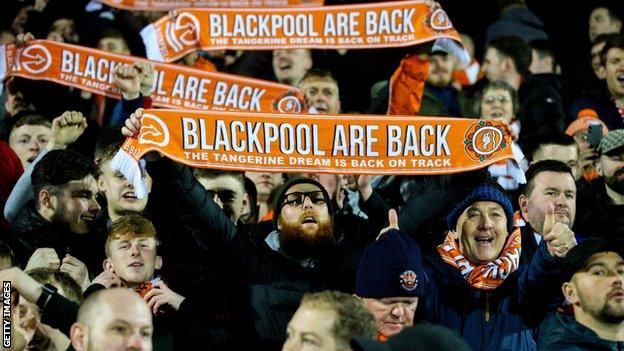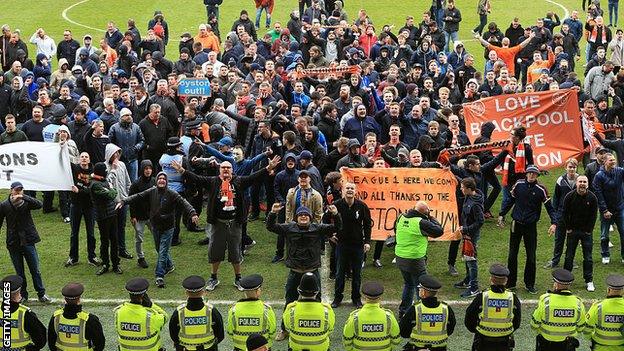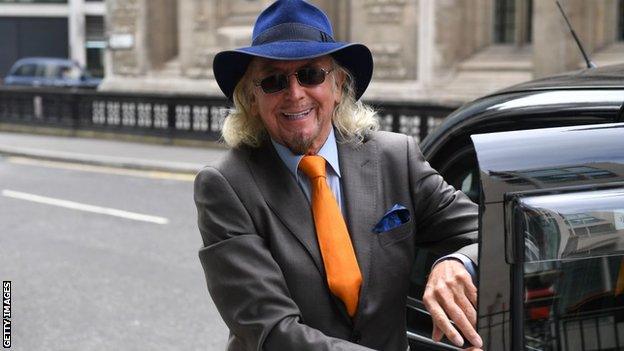Blackpool: Boycotting supporters set for emotional return after Oyston exit
- Published

1,823 Blackpool fans made the trip to Accrington Stanley on Tuesday night ahead of their return to Bloomfield Road
When Bloomfield Road opens its doors on Saturday, in excess of 14,000 Blackpool fans will welcome a new dawn for the seaside town that has its team back.
Following an excruciating wait, the League One visit of Southend United marks the end of the Oyston family's turbulent reign and an emotional return for the crowds.
An unwavering four-year boycott united supporters, yet Blackpool - a Premier League side in 2010-11 - appeared in free-fall. Plummeting into English football's fourth tier on the back of three relegations in five seasons, a sustained lack of interest from those in charge left fans with little optimism.
Now, after an arduous period of fleeting hope and demoralising set-backs, concluded by a High Court ruling on 13 February, the subsequent announcement of owner Owen Oyston's removal signals the end of a damaging struggle.
"When you've suffered for something, when you've been deprived of something and you've fought for it and won, that gives you so much pride," Blackpool Supporters Trust chairwoman Christine Seddon told BBC Sport.
"It's been a very, very, long, drawn-out and painful campaign. There have been some very dark times. When nothing seemed to be happening, that's when it was hardest."
'They know now what fans are capable of'
The atmosphere at Blackpool in recent years has been nothing short of toxic, with the owners suing fans for online comments epitomising the disconnect at the heart of the club.
A burning sense of injustice took hold as a Premier League legacy failed to materialise, and payments from the club to companies owned by Owen Oyston and his son Karl, former chairman, realised fans' suspicions of mismanagement.
Court rulings in November 2017, brought by shareholder Valeri Belokon, found the Oystons had "illegitimately stripped, external" £26.77m from the club. Yet still, despite the hope that accompanied the club being put up for sale, the stand-off rumbled on.
"People felt Oyston was never going to go," said Seddon, a lifelong supporter. "The courts decreed he was in the wrong, yet the authorities still wouldn't act. Nobody was doing anything about it.
"People were beginning to get very fed up. We tried to keep people motivated but nothing seemed to be happening.
"It was very important that the fans came together to have a voice because nobody was listening to us. It's that fan action that has made the difference."

Blackpool fans forced the club's final game of the 2014-15 season to be abandoned after occupying the pitch
Years of frustration reached breaking point in the Seasiders' final game of the 2014-15 Championship season; with the club rock-bottom, the protesting home support invaded the pitch and forced an abandonment of their fixture against Huddersfield.
Since then, the fans exercised the only power they possessed and swore not to give a penny more.
"We need to understand where the power actually lies," added Seddon. "If you can get yourselves organised and do as our fans have done, you can succeed. Blackpool fans have proved that.
"The fans have shown themselves to be so stoic, so courageous, so determined. Any new owner must tap into that and get us on side because they know now what the fans are capable of if they don't."
'Time for some new rules'?
The lack of progress - despite court findings that the owners had "abused their powers to the detriment" of the club - convinced supporters to question those overseeing their plight.
With Owen Oyston, convicted of rape, external prior to the 2004 introduction of the fit and proper persons test and breaking no rules under the EFL's owners' and directors' test, the sustained sacrifice of boycotting fans often appeared in vain.
According to Seddon, this triggered a "frustration and real anger".
"Blackpool is our priority but it is part of a much bigger problem," she added.
"I absolutely share the frustrations of fans - not just at Blackpool but at many clubs. There are real football clubs and real fans that are suffering real problems, and nobody is doing anything about it.
"If you've got someone like Owen Oyston, yet he's not breaking your rules, then it's time to get some new rules because that's embarrassing."

Owen Oyston had owned Blackpool for 31 years, famously buying the club for £1 in May 1988
Fans of Charlton Athletic joined Blackpool in staging protests outside EFL headquarters last year, with supporters adamant that inadequate intervention from the authorities was failing their clubs.
"It became obvious there was nobody overseeing what was happening, so when owners go rogue, who's dealing with it? The answer is absolutely nobody," said Seddon.
"Football without fans is nothing. We tried to engage with them, they didn't seem to want to engage with us, so we started to shine a light on the EFL."
This week, the EFL board agreed to allow Blackpool's receivers time to review their financial situation before it decides whether to invoke a 12-point insolvency penalty on the club.
The EFL told BBC Sport that it operates inside a regulatory framework of governance and that the regulations have often frustrated parties who think it should have done more with regard to the ownership of Blackpool.
It added that league officials hope they will be able to find a solution which will deliver the stability that will benefit Blackpool going forward.
Important lessons learned
While 'Homecoming Saturday' will bring jubilant scenes across the town and Bloomfield Road is set to transform into a roaring arena of tangerine, the underlying scars of such a drawn-out battle will take much longer to fade.
Lessons must be learned from Blackpool's experiences, and the Supporters Trust continues to appeal for an authority that is "effective, with real power to act and step in".
Protecting against unfit owners may be tricky, but alternative paths now become vital. Germany's 50+1 rule offers one such solution, in which all Bundesliga clubs require a 51% fan-owned majority.
Examples of fan ownership can, of course, be found much closer to home. In 2003, Exeter City was left on the brink and, with then-chairman John Russell jailed for the part he played in the club's demise, the Supporters' Trust took on the club and its debt.
It's a relationship referred to by current Trust chairman Nick Hawker as "community ownership".
"Football clubs should be immersed in the community. Glory can be winning the league or a cup, but any team can have the glory of being a benefit to the people who live there," said Hawker.
Boosted financially by a productive academy, Exeter have reached the last two League Two play-off finals. Defeated by Blackpool in 2017 and losing to Coventry last season, Hawker describes the Grecians' Wembley trips as a "great advert for fan ownership".
"Speaking to other clubs, they are looking at supporter ownership or part ownership as communities look to get involved in their football club, to reclaim it. It's too valuable to lose," he said.
"I take my hat off to Blackpool fans. The supporters have taken responsibility to change their position. They almost own their club already. They're reclaiming the club for the community and I think that's fantastic.
"They've been a credit to every football supporter in the country. Yes, it's taken a long time, but they got there."
Whether change will come from Blackpool's tale is yet to be seen. For now, the immediate improvement on the mind of the tangerine support is a return to their club.
"I'm very optimistic," Seddon added. "There are so many enthusiastic people desperate to get their club back. The opportunities are amazing. This can push Blackpool forward."